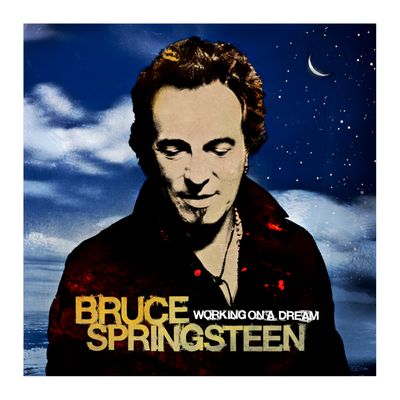Springsteen album strikes optimistic chord

It’s difficult to separate Bruce Springsteen’s “Working on a Dream” from the political optimism of the moment.
Springsteen was heavily invested in President Barack Obama’s campaign, and the glow of that triumph ripples through the album, which is being released today.
“Working on a Dream” is Springsteen’s best album since “The Rising” and possibly his most optimistic work ever. There’s a sense of renewal and even deliverance running through tunes such as “What Love Can Do,” “This Life,” “Kingdom of Days” and “My Lucky Day.”
Springsteen almost always frames his optimism in the context of a relationship. “Working on a Dream” is the first-person tale of a working guy seeking to find reward for himself and his woman through the sweat of his own labor.
Unlike so many ordinary Joes in the Springsteen songbook, this doesn’t sound like a man who’s been betrayed by life.
Complementing the upbeat mood, the music is powerful and energized with the full weight of the E Street Band behind its leader.
There are a few departures. “Tomorrow Never Knows” has a folkish, country fiddle backing that could have slipped easily into Springsteen’s 2006 release, “We Shall Overcome: The Seeger Sessions.”
“Surprise, Surprise” is, of all things, part love song, part birthday song. Over a loping rhythm, Springsteen tells his lover, this “is the start of a brand new day/and all that you have wished for I know will come your way.”
Of course, this is Springsteen, so there are occasional breaks in the euphoria.
The best song in the album may be the first track, “Outlaw Pete,” about a mythic figure of the best kind: “At 6 months old, he’d done three months in jail.”
This is the kind of narrative outlaw tale that borrows from such Dylan sagas as “Billy” and “Lily, Rosemary and the Jack of Hearts,” the American tall-tale tradition, a dab of Marty Robbins and an apparent swipe at Ennio Morricone’s “The Man With the Harmonica.”
The album closes with “The Wrestler,” a close cousin of Springsteen’s “The Hitter” or Simon & Garfunkel’s “The Boxer.”
The title song of the Mickey Rourke movie, it’s another saga of a used-up warrior who has nothing left to give but his pain: “I can make you smile when the blood hits the floor/Tell me, friend, can you ask for anything more?”
An honest assessment of “Working on a Dream” demands recognition of the one song that seems wildly out of sync, not just with the album but Springsteen’s entire body of work.
“Queen of the Supermarket” is a mousy fantasy about a guy who’s secretly in love with the bagger at his local grocery. He’s totally smitten with “the way she moves behind the counter” and says, “Each night I take my groceries and I drift away.”
It’s part musical sitcom, part nod to ’60s girl-group dramas such as “Leader of the Pack.”
But when did Springsteen ever operate on such a broad and campy level?